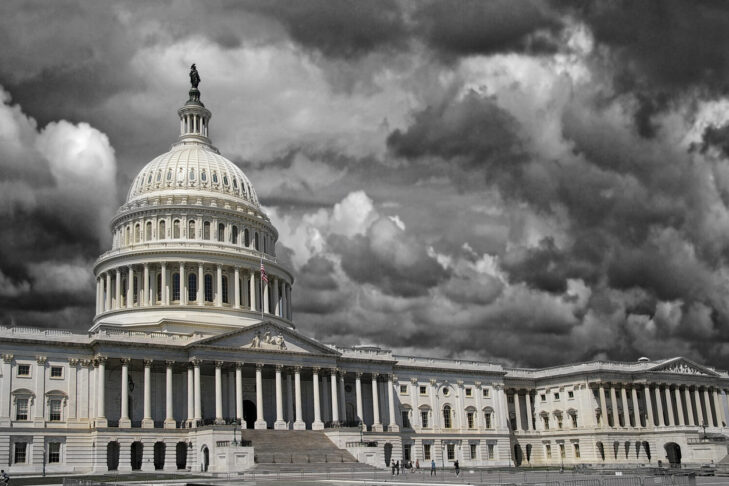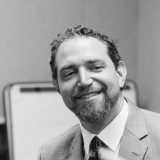I only wish I could say: “We told you so.”
If you’re a Jew, one image stands out from the gruesome scenes of carnage at the nation’s capital. It is of a rioter wearing a hoodie emblazoned with the words “Camp Auschwitz” and a skull and crossbones, along with the phrase “work brings freedom”—an English translation of German words spelled out over the gate of the Nazi death camp: Arbeit macht frei.
For anyone paying attention to what’s happened in the U.S. over the last few years, this wasn’t surprising. It was in October 2018, of course, that a white supremacist, radicalized on the internet, opened fire on the Tree of Life synagogue in Pittsburgh on a Shabbat morning, murdering 11 Jews.
“I genuinely fear that we are seeing the culmination of something that has been boiling over for some time now,” said John Horgan, a professor at Georgia State University’s Global Studies Institute, who was quoted in the Pittsburgh Post-Gazette following the shooting. “And I fear that we’re not prepared for it.”
Sure enough, six months later, another shooter opened fire at the Chabad house in Poway, California, killing another Jew. He, too, found a home in an online community of rage. An antisemitic and racist letter he posted on the online forum 8chan shortly before the shooting accused Jews of preparing a “meticulously planned genocide of the European race.”
These weren’t the first Americans whose radicalization resulted in the murder of Jews. But it is the internet that has cultivated deeper and even more deadly connections among white supremacists. Since mid-2016, the number of antisemitic comments on far-right social networks has nearly doubled, according to Network Contagion Research Institute director Joel Finkelstein, quoted in the same Post-Gazette story.
Those same online radicalized white supremacists would eventually lead the charge on the Capitol. Many are adherents of the fever-dream QAnon conspiracy, which regularly trafficks in racist and antisemitic rhetoric. Others ally themselves with the Proud Boys—whom President Trump notoriously instructed to “stand back and stand by”—which includes among its ranks a leader who insists that “the West was built by the White Race alone and we owe nothing to any other race.”
You might imagine that, as the cesspool of online hate took Jewish lives, Jews would have been on the forefront of efforts to combat these murderous forces. You might imagine that, as we mourned our dead, Jews would have been sounding alarm bells with state and federal officials, warning them of the dangers of radicalized white supremacists—Jews serving, yet again, as the proverbial “canary in the coal mine.”
And yet I am bitterly, deeply disappointed that we did precious little of the work of fighting white supremacists. Some of us specifically undermined it.
“In a free society, some are guilty,” Rabbi Abraham Joshua Heschel famously taught us, “but all are responsible.”
God forbid we charge Jews with any guilt for the carnage unleashed in D.C. on Jan. 6. And yet, legacy Jewish institutions bear some responsibility for the riot. After Pittsburgh and Poway, we didn’t use our moral authority to push harder to combat white supremacist hate groups. We didn’t insist that Congress and the president confront this deadly menace head on.
We didn’t tell you so.
Instead, the Jewish community chose a response that favored technological and law enforcement solutions for a problem rooted in hate. Jewish groups lobbied to establish grants to provide greater defense of buildings and property, while largely ignoring the threat of online racism and antisemitism.
I am glad that our buildings are safer than they have been, and I am grateful for the funds—some of which have been utilized in my community—that have helped us achieve those goals.
But I am deeply disappointed that these efforts were not matched with a similarly robust demand for our policymakers to denounce and uproot racist and antisemitic white supremacists—the same white supremacists who ultimately sought to kill U.S. representatives, senators and our vice president.
Even at this moment, the Jewish Federations of North America, planning a virtual mission to D.C. under the banner, “Uniting to Secure a Bright Jewish Future,” do not seem to have fighting white supremacy on their radar. While they reference “domestic violent extremism,” their strategy is to “build more allies in Congress to help ensure that our community has the resources it needs to protect against and respond to these horrific trends.”
Such defensive posturing only serves to leave the root of the extremism—white supremacy—unaddressed.
One can only wonder why. Perhaps it is because some parts of the Jewish world have been unwilling to challenge a Trump administration that was a “friend to Israel.” Unfortunately, relying on such “friendship” meant we didn’t demand a nationally coordinated response to racist and antisemitic hate groups. It has left American Jews, and now non-Jews, to grieve over bloodshed in our midst.
Our deadly encounters with American racism and antisemitism should have led us to sound a warning to the rest of the nation. They did not. The consequences were catastrophic.
For the victims of the deadly violence in Pittsburgh, in Poway and at the Capitol, it is too late. For the rest of the country, we owe it to them and to ourselves to speak loudly against the forces of hate that threaten to destroy us all.
This post has been contributed by a third party. The opinions, facts and any media content are presented solely by the author, and JewishBoston assumes no responsibility for them. Want to add your voice to the conversation? Publish your own post here. MORE



